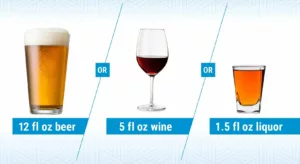There are many reasons people make the choice to drink alcohol. Having a drink with a friend after work or toasting milestones and special events is socially acceptable. Drinking is seen as a way to decompress, relax or socialize with others. But, drinking often or too much to deal with feelings of anxiety or depression can be problematic, dangerous even. An estimated 40 million Americans are affected by substance abuse with alcohol use disorder afflicting 16 million adults and almost 300,000 children each year.
So, what’s one drink?
“A drink” depends on the type of alcohol being consumed, your gender and your size. The National Institute on Alcohol Abuse and Alcoholism defines the following as one standard drink:

- Men are advised to consume two drinks or less in a day (no more than 4 drinks in a day and no more than 14 drinks in a week).
- Women’s bodies process alcohol differently than men. They are advised to consume less alcohol – one drink or less in a day (no more than 3 drinks in a day or 7 drinks in a week).
- Pregnant women, people under the age of 21 or people with health conditions or medications that interact with alcohol should not drink any alcohol.
- When it comes to alcohol, less is best. Choosing not to drink or drinking in moderation is the healthiest option.
When can drinking be a problem?
- Drinking heavily: Consuming more alcohol than the daily or weekly guideline amounts.
- Binge drinking: Consuming excessive amounts of alcohol in a short timeframe. Binge drinking creates a spike in the blood alcohol content. For example, binge drinking for a woman looks like consuming four drinks in a two-hour time span or five drinks for a man. People who binge drink are more likely to experience “blackouts” or have lapses in judgement or memory.
- Alcoholism: Also known as alcohol dependence, is a disorder identified by an uncontrollable urge to drink, the inability to stop drinking once started, the need to drink higher quantities more often to feel the effects (tolerance) and/or experiencing withdrawal symptoms when not drinking. Sweating, anxiety, nausea and shakiness are all withdrawal symptoms.
How do I know if I have a problem?
Monitoring your alcohol intake is important for your health and overall well-being. Here are questions to ask yourself.
- Do you have a change in personality when you drink?
- Do you drink to be more outgoing or to be more social?
- Have you missed work, appointments, or events because of your drinking?
- Do you use alcohol to help you deal with problems or when upset?
- Is it hard to stop drinking after one or two drinks?
- Do you end up drunk once you start drinking?
- Have you tried and failed to drink less alcohol or to stop drinking entirely?
- Do you sometimes have trouble remembering what you did while under the influence of alcohol?
- Do you regret your words or actions while under the influence?
- Have friends or family members expressed concerns about your drinking?
- Has your work suffered because of your drinking?
- Have you needed a drink in the morning to get going after a night of drinking?
If you answered “yes” to many (or all) of these questions, you may be drinking too much. Help is available if you think you might have a problem.
How do I get help for myself or my loved one?
Arkansas Blue Cross and Blue Shield provides benefits to members seeking help for substance use.
- Connect with a peer support specialist. Peer support specialists are non-clinical members of the behavioral health team who have experienced the same or similar problems with substance use and help with the recovery process. If you think you could benefit from peer support, please call 800-225-1891, Monday through Friday, 8 a.m. – 4:30 p.m.
- Connect with Bright Heart Health, virtual health services. On-demand substance use disorder and pain management virtual visits are available including medication management, counseling, and support services to help guide you or a loved one to recovery. Visit the Bright Heart Virtual Clinic or call 800-892-2695.
- For more information about mental and behavioral health, click here.
Tips for Friends and Family
- Be supportive. Your friend or family member may be having a hard time or has been struggling alone. Providing support and understanding lets the person know you care about their well-being. This will make them more likely to seek help.
- Be gentle but persistent. Your loved one may not be ready to share what they are experiencing right now. Even though this may feel discouraging, it’s important to not give up. Eventually your loved one may want to share what they are feeling and experiencing.
- Listen without lecturing. Listen to everything your loved one has to say before asking questions and avoid criticizing. The person may already be in a delicate state and needs supportive communication. By criticizing, you may discourage communication.
- Be honest. Let your loved one know what you’ve observed and why you are worried about them.
- Stay calm. You may feel a range of emotions by what your loved one shares with you – shocked, angered, sad, scared – but staying calm will help the both of you. Controlling your emotions will encourage the person to keep communicating with you so you can better help them.
- Encourage help. Let the person know how they can benefit from professional help. Assist in finding help and resources for the person if they ask for it.

